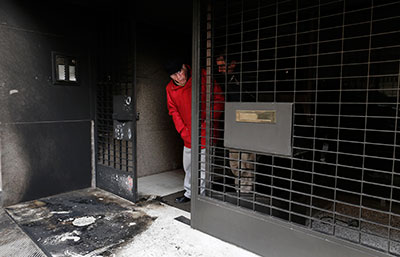Greek journalists are on the alert since five small bombs exploded Friday on the doorsteps of the homes of several journalists in Athens. Although the makeshift devices only damaged the buildings’ entrances and no one was hurt, the attacks appear to be warning shots in a tense social context where journalists are increasingly in the firing line.
Greece has been in the throes of a deep recession for years and at the behest of its EU partners and international financial institutions, the government has adopted tough austerity measures which have sparked a cascade of angry and at times violent protests.
Some radical groups have turned to direct attacks on public and private institutions deemed to represent the system. On Monday morning, unidentified assailants opened fire on the headquarters of Greece’s ruling center-right party, New Democracy, in the center of Athens, leading government spokesman Simos Kedikoglu to denounce what he described as “a new and worrying escalation of the effort to create terror in our society.”
The establishment media are also in the crosshairs. Friday’s attacks targeted journalists working with major news outlets: Antonis Skyllakos, director of the official Athens News Agency (AMNA), and his journalist wife Evangelia Baltatzi; Giorgos Ekonomeas, anchor with Mega TV; Antonis Liaros, an adviser to the ERT public television channel, and Petros Karsiotis, a crime reporter for Alpha TV. Christos Konstas, a former journalist and now spokesman of the state privatization agency, was also targeted.
In a message posted on the Internet, two unknown anarchist organizations calling themselves “Fighting Minority” and “Circles of Offenders/Nuclei of Lawlessness” claimed responsibility for what they called “attacks against the state,” as if these journalists were stooges of the government. The media, they argued, “are the main managers of the oppressing state designs, manipulating society accordingly.”
“It was a message to the media and to some journalists to change the way they report the news on the economic crisis,” said Manolis Kostidis, a journalist with the Eleftheros Typos daily newspaper, in an interview with Russia Today. “It is not easy to be a journalist in Greece,” he said. “We have to be careful about the way we are presenting the news.”
Amid the financial turmoil and social disruption, Greek journalists are targeted from all sides. On Thursday, a group of far-left militants broke into private radio station Real FM and forced the channel to broadcast a statement of solidarity with squatters who had been evicted from the Vila Amalia, an iconic meeting place for radicals and students in the Greek capital.
The far right has also joined the fray: Chryssi Avgi (Golden Dawn), the xenophobic neo-Nazi party which gained 7% of the vote and 18 seats in June’s election, has crudely dealt with journalists that it sees as hostile to its extremist views.
The Greek government has strongly denounced these attacks against the press. “There is an open effort to terrorize the media, a vital part of our democracy,” said spokesman Kedikoglou.
But state authorities have also contributed to the deterioration of press freedom. In October, Greek police arrested Kostas Vaxevanis, a prominent journalist and the editor of the investigative magazine Hot Doc, who had published the Lagarde list, a document named after International Monetary Fund Managing Director Christine Lagarde that revealed the names of about 2,000 wealthy Greek citizens with Swiss bank accounts. Although he was released within a week, the prosecution appealed the decision and he is facing a retrial.
The police, who are suspected of collusion with the far-right, according to news reports, have also beaten up reporters and photojournalists covering street protests. “The police don’t want professional witnesses to the level of systematic violence they use against demonstrators, no matter how peaceful they are,” Mario Lolos, the president of the Greek photojournalists’ union, who had been brutally attacked by police while covering a demonstration, said in April 2012.
“Greek journalists will not be terrorized or stifled; democracy will not be threatened,” the Journalists’ Union of Athens Daily Newspapers (JUADN) said in a January 11 statement. However, even in the cradle of democracy, treating journalists as scapegoats for the woes of the country seems to be becoming the norm.
[Reporting from Brussels]
